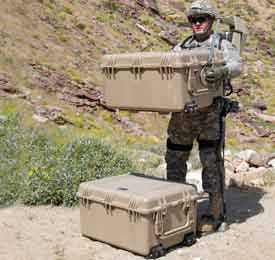Articles >>
U.S. Army Natick Soldier Center Awards Lockheed Martin Contract To Perform HULC™ User Testing
Category: Robots

ORLANDO -- Lockheed Martin has received a $1.1 million contract from the U.S. Army Natick Soldier Center for test and evaluation of its next-generation HULC™ advanced robotic exoskeleton, designed to augment Soldiers’ strength and endurance, as well as reduce load carriage injuries. Under this contract, the U.S. Army will test Lockheed Martin’s advanced ruggedized HULC design. The upgraded HULC system includes optimized control software, extended battery life and human factors improvements for quicker and easier sizing to each user. Lockheed Martin is also exploring exoskeleton designs to support industrial and medical applications. “The tests performed on Lockheed Martin’s HULC system will help us assess the current state of the technology,” said David Audet, U.S. Army Natick Soldier Research, Development and Engineering Center, which awarded the contract. “Exoskeletons have the potential to reduce stress on the body from heavy loads.” Dismounted Soldiers often carry heavy combat loads that increase stress on the body, leading to injuries and exhaustion. HULC is designed to transfer the weight from heavy loads to the ground through the robotic legs of the lower-body exoskeleton, taking the weight off of the operator. An advanced onboard micro-computer ensures the exoskeleton moves in concert with the operator. HULC is an un-tethered, battery powered, hydraulic-actuated anthropomorphic exoskeleton capable of performing deep squats, crawls and upper-body lifting with minimal human exertion. “We recognize the importance of perfecting the exoskeleton technology to redefine what is possible for our Soldiers,” said Rich Russell, director of Sensors, Data Links and Advanced Programs at Lockheed Martin Missiles and Fire Control. “HULC will meet Warfighters’ future mobility and sustainment needs. Working with the Natick Research Center to evaluate the system will further enhance our ability to meet our customer’s needs and requirements.” Researchers at Natick Soldier Center will evaluate how the HULC affects Soldiers’ performance. Additionally, biomechanical testing will measure the energy expended by a Soldier when using the HULC. The laboratory testing will also assess how quickly users learn to use the HULC system when carrying various loads and moving at various speeds. The contract includes options for field trials to test the system’s utility in operational environments. Headquartered in Bethesda, Md., Lockheed Martin is a global security company that employs about 136,000 people worldwide and is principally engaged in the research, design, development, manufacture, integration and sustainment of advanced technology systems, products and services. The Corporation reported 2009 sales of $45.2 billion. |
|
HULC

Dismounted Soldiers often carry heavy combat loads that increase the stress on the body leading to potential injuries. With a HULC exoskeleton, these loads are transferred to the ground through powered titanium legs without loss of mobility. The HULC is a completely un-tethered, hydraulic-powered anthropomorphic exoskeleton that provides users with the ability to carry loads of up to 200 lbs for extended periods of time and over all terrains. Its flexible design allows for deep squats, crawls and upper-body lifting. There is no joystick or other control mechanism. The exoskeleton senses what users want to do and where they want to go. It augments their ability, strength and endurance. An onboard micro-computer ensures the exoskeleton moves in concert with the individual. Its modularity allows for major components to be swapped out in the field. Additionally, its unique power-saving design allows the user to operate on battery power for extended missions. The HULC’s load-carrying ability works even when power is not available. Lockheed Martin is a leading provider of advanced technology solutions for the Warfighter including ground Soldier systems such as wearable situational awareness equipment and mobility assistance systems. Future advancements in exoskeleton technologies will focus on specific user communities, shifting energy and performance requirements. Lockheed Martin is also exploring exoskeleton designs to support industrial and medical applications. |
Lockheed Martin |
Lockheed Martin Autonomous Driving System Tops 55,000 Miles in Extended Army Testing
30.11.2017
SAAB Chosen As Sub-Contractor For The Ajax Virtual Crew Turret Trainer
14.10.2017
Lockheed Martin Electro-Optical Systems
Lockheed Martin Vought Systtems Corporation
Lockheed Martin Missiles and Fire Control
Discuss
